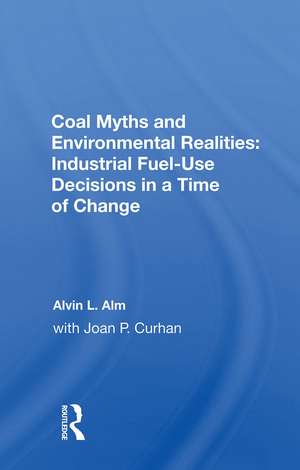Coal Myths And Environmental Realities: Industrial Fuel-use Decisions In A Time Of Change
Autor Alvin L. Almen Limba Engleză Hardback – 7 iun 2019
Preț: 764.20 lei
Preț vechi: 1027.40 lei
-26% Nou
Puncte Express: 1146
Preț estimativ în valută:
146.36€ • 150.79$ • 122.60£
146.36€ • 150.79$ • 122.60£
Carte tipărită la comandă
Livrare economică 24 februarie-10 martie
Preluare comenzi: 021 569.72.76
Specificații
ISBN-13: 9780367015398
ISBN-10: 0367015390
Pagini: 172
Dimensiuni: 152 x 229 mm
Greutate: 0.45 kg
Ediția:1
Editura: Taylor & Francis
Colecția Routledge
Locul publicării:Oxford, United Kingdom
ISBN-10: 0367015390
Pagini: 172
Dimensiuni: 152 x 229 mm
Greutate: 0.45 kg
Ediția:1
Editura: Taylor & Francis
Colecția Routledge
Locul publicării:Oxford, United Kingdom
Cuprins
Also of Interest -- Preface -- Introduction -- History of Industrial Fuel Use -- The Costs of Industrial Fuel Use -- The Process of Industrial Fuel-Use Decisions -- The Clean Air Act and Industry Decisions -- Energy and Environmental Quality -- Major Air Quality Programs Affecting Industrial Fuel Choice -- Case Study Methodology and Summaries
Descriere
This book deals with two inconsistent myths that persistently surround industrial use of coal. The first myth is that the Clean Air Act precluded the use of coal; the second, that industrial use of coal will expand rapidly as a result of purely economic choices. Through analyzing fuel-use decisions actually made by industry, Mr. Alm concludes that environmental quality standards have played a minor role in industrial choice of fuel. Historically, natural gas and oil have been both less costly and more convenient fuels for industry to use. Coal gained a substantial economic advantage over oil after the oil price increases of the last decade, yet it continues to maintain a lower market share than economics alone would suggest. Mr. Alm demonstrates that coal's share of the fuel market will continue to remain low because of the way U.S. businesses view fuel-use choices. For most U.S. firms, energy costs are a relatively small portion of total costs and a minor factor in a firm's ability to compete. Faced with alternative capital projects to expand production facilities or to make mandatory investments, companies do not generally give high priority to coal conversion projects. Moreover, most U.S. firms have little experience with burning coal, and that lack of expertise creates additional psychological and institutional barriers to coal's use. Finally, there is a tendency to prefer high-payoff, short-term investments over projects that promise cost savings many years in the future. These are all strong reasons for coal's lackluster performance in the industrial market—much more potent forces than environmental regulations.
